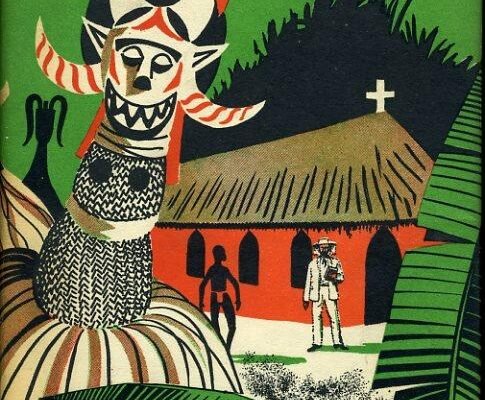I have just finished re-reading Chinua Achebe’s classic novel, Things Fall Apart. The experience was even more rewarding this time around—revisiting those witty lines and vivid scenes after so many years.
The first time I read the book was as a teenager in high school, when it was compulsory for students of Literature in English. Back then, my engagement with it was purely academic. But reading it again now, for pleasure and with more mature eyes, I came away with a fresh conviction: even with its global fame, Things Fall Apart has not yet received all the recognition it deserves. Nor has the world fully understood the deeper messages woven into its pages.
Most readers and critics focus—rightly—on Okonkwo, the proud and tragic hero whose downfall defines the novel. Much less attention is paid to other characters whose roles are equally revealing: Nwoye, Okonkwo’s conflicted son; Enoch, the overzealous Christian convert; and the “kotma”—the court messengers who served as interpreters and local enforcers for the British colonial authorities in Umuofia.
Their motives varied. Some sought to escape the moral contradictions of traditional society. Others simply wanted survival or status as the trusted lieutenants of the new White rulers. But Okonkwo could not comprehend how anyone could abandon his kin to become an instrument of their conquerors—agents of their own community’s subjugation.
It was the actions and attitudes of these men that tormented Okonkwo and finally drove him to suicide. Achebe’s portrayal of them is not merely literary; it is sociological, psychological, and philosophical. He lays bare the internal weaknesses that doomed Umuofia long before the colonial masters consolidated their rule. His message, though subtle, is devastating: Umuofia fell apart not primarily because of the White man’s might, but because of its own moral frailty, disunity, and political fragility.
Ironically, similar social and political tensions in Europe had once led to reform, revolution, and exploration—not surrender. Umuofia could declare war on a neighboring village over a single slain clansman, yet could not summon the same resolve to confront the far greater threat of foreign domination.
Why, then, does Africa remain home to so many “Umuofias”? Why does the continent still overflow with converts and collaborators—men and women eager to advance the very forces that undermine their societies? Why do so many fail to see that no personal gain can compensate for the loss of collective dignity and moral cohesion?
As one of Okonkwo’s maternal elders reminds him, “We do not understand how strong is the bond of kinship, and what it is to speak with one voice.”
Okonkwo’s friend, Obierika, is more perceptive. He recognizes the flaws in his people’s worldview and their reluctance to adapt intelligently to change. Yet he does nothing. He represents those who know but fail to act—paralyzed by the enormity of the task before them.
Through such characters, Achebe makes a profound point: no external power can conquer a people who are united, self-aware, and guided by shared values. Umuofia—and by extension, Africa—fell because it was divided within.
Yet Things Fall Apart is too often misrepresented as merely a window into precolonial Igbo society and its encounter with Western civilization. That interpretation captures only part of Achebe’s vision. Beyond the small fictional villages of Umuofia and Mbanta, this novel is a parable—a moral fable about the collapse of African civic life, the erosion of indigenous values, and the continent’s continuing vulnerability to internal betrayal.
History records only one major African exception to that collapse: Ethiopia. Under Emperor Menelik II, Ethiopians refused to be colonized. In 1896, they raised an army of 120,000 men and women, led by twelve generals, to defeat Italian forces at the Battle of Adwa. Their weapons were inferior; their determination was not. They won through unity, courage, and the conviction that their sovereignty was non-negotiable—decades before Achebe ever put pen to paper.
Today, nearly seventy years after Things Fall Apart was first published, Africa still faces its old demons: leaders who serve foreign interests rather than their own people; elites who prefer migration to nation-building; citizens who mirror the greed and apathy of those they condemn.
Like Umuofia, much of Africa continues to crumble from within—fragmented by selfishness, ethnicity, and short-term ambition. And we still avoid the painful conversation about why.
The novel’s final tragic moment, when Okonkwo kills a colonial messenger and realizes his people will not fight back, encapsulates this truth. Achebe writes:
“He knew that Umuofia would not go to war. He knew because they had let the other messengers escape. They had broken into tumult instead of action. He discerned fright in that tumult.”
In the end, Umuofia—and Africa—did not lack brave men. It lacked the collective will to defend what truly mattered: shared values, community, and the future of its children. It fell to enemies within.
So, has anything really changed since Achebe wrote his masterpiece? Is Africa unaware of his message—or has it chosen to ignore the real reasons why things fall apart?
Victor Anazonwu is a Nigerian writer and public affairs analyst based in Lagos. He is the author of five books, including What Everyone Should Know About Nigerian History, Politics and Government (2017).
![]()



